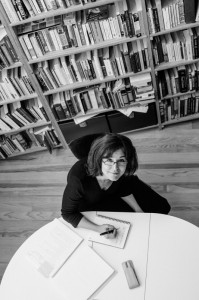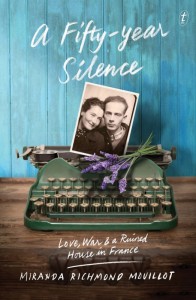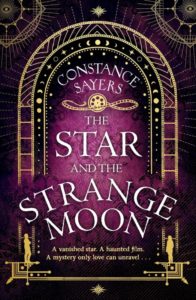Author Interview: Miranda Richmond Mouillot
 A Fifty-Year Silence is the new book from author, Miranda Richmond Mouillot and was released today. Miranda has joined us to chat about her new book. Firstly, she tells us a little about A Fifty-Year Silence and what inspired her to write it?
A Fifty-Year Silence is the new book from author, Miranda Richmond Mouillot and was released today. Miranda has joined us to chat about her new book. Firstly, she tells us a little about A Fifty-Year Silence and what inspired her to write it?
In 1953, my grandmother, Anna Munster, packed her bags and walked out on my grandfather Armand Jacoubovitch, taking the typewriter, a grapefruit knife, and their two children.
Five years before that day, in 1948, Armand and Anna bought a ruined stone house in the south of France a month before moving to America to start a new life.
Eight years before that day, in 1945, Anna gave birth to their first child while Armand prepared to begin his job at the Nuremberg Trials as one of just two or three court interpreters who were also victims of the accused.
Eleven years before that day, in 1942, Armand and Anna climbed over the Alps in a snowstorm, reached the border an hour after the guards had gone off duty, and escaped Nazi-occupied France to neutral Switzerland.
Thirteen years before that day, in 1940, when France fell to the Nazis, Armand walked three hundred kilometers to hide out with Anna in a village in the French Pyrenees.
And seventeen years before that day, in 1936, Armand and Anna met in a café in Strasbourg and fell passionately in love.
Or did they?
Here’s the thing: I never knew.
The story of what happened between my grandparents both before and after their divorce was total enigma to me throughout my childhood and young adult life. No one could tell me when or how they had met, or when or why they had gotten married. No one could explain just what had made their separation so acrimonious. No one knew, because half a century later, they still wouldn’t speak to one another. If they referred each other at all, it was in cryptic half-sentences. My grandfather couldn’t even bear to utter my grandmother’s name. All that remained of their life together were a few snapshots in a faded photo album. Those snapshots, those tiny, beautiful remnants of a life the war had completely destroyed – they were the beginning of writing this book: from a young age, I desperately, desperately wanted to know what had happened between them.
 What it was like to write this book? What process did you go through?
What it was like to write this book? What process did you go through?
Putting half a century of silence into words was laborious and long! It took ten years of my life: ten years of research, interviews, letter writing, false starts, weird jobs, dashed hopes… and most of all, of gaining maturity. The story was so complicated, and so concealed, that I actually wrote it as a novel before taking the plunge and telling the whole thing as nonfiction – but I think every writer needs to cut her teeth on a first book, and the novel version served that purpose for me.
Ultimately, writing this book changed my entire life. When I began I was a girl haunted by the past: I suffered from recurrent nightmares of the horrors my family had lived through. Now I have completed it, the nightmares are gone. The process was a goodbye to my beloved grandparents, whom I lost along the way – my grandmother in 2010 and my grandfather just two months ago, on the day A Fifty-Year Silence was released in the US. And it brought me where I am now, to the family I have built here in France, with my husband and daughter.
What sort of planning did you undertake before beginning? What elements needed to be in place?
I began writing the very first fragments of this book when I was nineteen, not an age known for incredible planning skills. A couple of years later, having just graduated from university with a degree in history, and planning to return to the study of history, I set off for a gap year in France with enough grant funding to plunge into the research. My hope was to interview my grandparents, do the archival and secondary reading, and get the book written – all in that one year! As I say, the early twenties are not known for realistic planning skills… Slowly, as I amassed more and more research, I began to see that structure and outline are just as important as information-gathering and enthusiasm. Whether you are writing fiction or non-fiction, you need to have a firm grasp of the rhythm and narrative arc of your story. Until I had those elements in place, I couldn’t make it hang together as a book.
Out of all the books you’ve read, which three have impacted you most and why?
It’s hard to pick out just three – when you are a writer, I think reading and being affected by books is one of the most important parts of your job description. If I had to choose, I’d say Michel de Certeau’s The Writing of History, for the way it complicated and deepened my understanding of what it means to talk about the past; Dylan Thomas’s Under Milkwood, for its perfect and powerful distillation of the poetry and pathos of everyday life; and Norton Juster’s The Phantom Tollbooth, the first novel I ever read – and then read again and again and again, to figure out just how the author did that crazy magic.
If you could travel to any point in history, where would you go and why?
As odd as it sounds for a person who spends most of her time researching and writing about the past, the answer is nowhere – not if it meant I had to give up a single morsel of the present moment. I’d love to meet a medieval anchoress; I’d love to have marched on Washington in 1963 – and of course I’d love to have been at the adjoining table in the café where my grandparents first locked gazes in 1936. But I’m very much a here and now kind of lady. Every day is so full of wonder and surprises; why go anywhere else?
Which fictional character would you want to meet and why?
I’ve always had a bit of a crush on Tom Robbins’ Bernard Mickey Wrangle (aka ‘the Woodpecker’). He’s the only outlaw in the world with a black belt in haiku and Donald Duck sunglasses (not to mention an astonishingly resourceful tongue). I’d love to have tea with a much gentler rebel, Dorothea Brooke, the heroine of Middlemarch. I think she’d be the most lovely, dear friend to get all wrought up with about the complicated world. At the end of the day, though, I’d probably pick any of the characters in the novel I’m working on right now. I can’t say much more about them at this point, but I’m very fond of them.
What is your favourite word?
I like all the words! Words are my livelihood and my passion. I am tempted to answer that whatever word is right for the sentence I’m crafting at the moment is my favourite one. But I do have an odd category of favourites to share: in my head, I keep a little collection of words that I love to hear and say, but whose meanings don’t match up with the way they sound. ‘Stagflation’ is one (I think it should mean the little creaky sighing sounds a bog makes on a hot summer night); ‘arugula’ is another (that should be a baby duck with a bad head cold), or ‘haberdasher’ (which ought to describe the those days and weeks where you’re so busy you can’t remember what you did when you get to the end of them). And – with apologies to my mom and my four year-old – I really, really love a well-placed swear word. I agree wholeheartedly with Henry Drummond in Inherit the Wind: “I don’t swear just for the hell of it. Language is a poor enough means of communication. I think we should use all the words we’ve got. Besides, there are damn few words that anybody understands.”
Five tips for new writers?
The only thing that makes you a writer is writing. Go write, and you’ll be a writer.
Do it every day.
Don’t be afraid if it’s hard: some of the best things in life are the ones you’ve worked hard for.
Read as much as you possibly can.
Never be afraid to rip it up and start over again.
Miranda was born and raised in the heart of the Blue Ridge Mountains, in Asheville, NC. She came into this world intolerant of all things institutional, quit school twice, and spent a year in a mournful and drafty boarding house in Switzerland, but ultimately managed to graduate from Asheville High School and then from Harvard College, where she studied History and Literature. She moved to France in 2004 to write A Fifty-Year Silence, intending to stay just a year, but she got sidetracked by the writing process and a stonemason named Julien. A Fifty-Year-Silence is published on 26th March 2015 by Text Publishing Company.
Click here to view A Fifty-Year Silence at Amazon UK.
To find out more about Miranda, visit her website: http://www.wordsfrommiranda.com






Leave a Reply